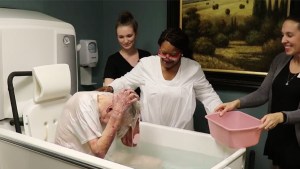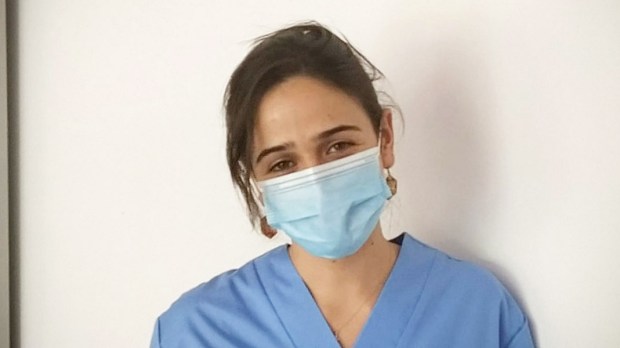Inés is 23 years old and in her sixth year of medical school—her last year. Behind her are years of rigorous study to get into the career she wanted, and hours and hours of taking and re-taking notes to become a doctor.
Like everyone else, Inés never imagined she would live through a worldwide pandemic. We have all suffered in one way or another from the consequences of COVID-19. Some have suffered only socially and financially, while many have lost family members, and others have had to fight the virus themselves.
Inés is one of that last group. The arrival of the virus caught her working in emergency medicine, and she was one of the first to be infected. But that’s not why she made the front page of one of Spain’s biggest newspapers.
Thousands of people have read her story, but they may not know what’s behind it. It all started when her aunt moved into her house. She’s a doctor and works in one of the most important palliative care hospitals in the country.
Inés decided to self-isolate so as not to spread the virus to her parents, and went to live with relatives who’d already had the disease. Everything was normal until Mercedes—Inés’ aunt—suggested that she go work as a volunteer at Laguna Hospital.
Mercedes said that there was a great need, because “infected people are very alone.” Her hospital had a very important palliative care unit, reserved for patients whose death is imminent.
Inés thought, “What am I going to do there, with terminal patients?” But her aunt had planted the idea in her mind, and it wouldn’t go away.
She asked herself, “What do I want to remember about this quarantine? Having been at home for two months studying, or having done something really worthwhile?”
Volunteering in palliative care
Inés had volunteered before, but never in a hospital during such a serious health crisis. Even so, she felt “confident because she had already been through” the disease. Knowing that “the important thing is to do good,” she decided to go ahead, rather than continue “wasting her time.”
“At first I was on the COVID floor and helped because they were short of staff—they were infected,” she said. Inés dedicated her time to “making the beds, feeding … basically the role of the assistants. And above all I was with the patients, because no one could visit them.”
She continued her medical school courses during this time, doing schoolwork in the morning, with her focus on becoming a pediatrician or family doctor. In the afternoon, she dedicated herself to accompanying sick people as they died.
She had expected to diagnose patients, attend the sick, prescribe treatments and discharge healed patients, but she ended up simply sitting next to people as they were dying.
Accompanying the dying
“I was used to playing the role of the five-minute doctor,” says Inés. “When the doctor leaves the room, you realize [patients] tell you things they don’t tell him. I could see what the patient expects from you. A doctor is reassuring, but having a person next to you to hang out with and who is listening to you is extremely important.”
She says that “many old people wanted to give you kisses even though you had all the protective measures, they held your hand and wouldn’t let go … I’d never been with patients who were near death. It made a strong impression on me. It marked me, but I liked to see the tranquility that existed around death, and the fact that you could talk about it.”
At Laguna Hospital in Madrid, the staff is used to this type of situation. “The doctors here are incredible. Interns who came to practice from other hospitals were amazed at the treatment patients receive at Laguna. The patients like the doctor to ask questions. They’re at a moment when they feel vulnerable, and it’s important to treat them right.”
The secret source of Inés’ strength
Inés says she has realized “how important it is to accompany them. To be there. There was a woman, for example, with whom I couldn’t connect. Her husband died, and she was close to dying herself … So since she didn’t talk to me, I would sit with her and watch TV shows. Now, instead, she always asks me about the test results. Just by being there, people open up and you don’t need to do anything more.”
Her testimony is one of many that have emerged in recent months. Amidst the tragedy, many people whom Pope Francis calls “saints next door” have emerged. Inés could be considered one of them.
What gives someone the strength and compassion to deal with a difficult situation like the one we’re living? To some extent, we could attribute it to a natural disposition towards empathy. But it seems like there’s something more than nature at work here.
Indeed, Inés has a secret that helps explain her work. Even if it didn’t make the front page of the newspaper where her story was told, the young woman stops to visit the chapel every day before starting her work as a volunteer.
She explains the reasoning behind these visits, and how she asks God to work through her:
“I do this due to my faith. I know that if I didn’t pray at first, I couldn’t do it. I tell God that I want those who see me … to see Him. Otherwise, I wouldn’t do my job as well. It’s about being God’s instrument, making yourself available to Him with the talents you have.”
Javier Gonzalez Garcia

Read more:
Man receiving hospice care receives his dying wish … to be baptized

Read more:
He didn’t want any COVID-19 patient to be without a Bible

